Your basket is currently empty!
-
From Fiddle to Phin: Ethan’s Experience of Storytelling through Music
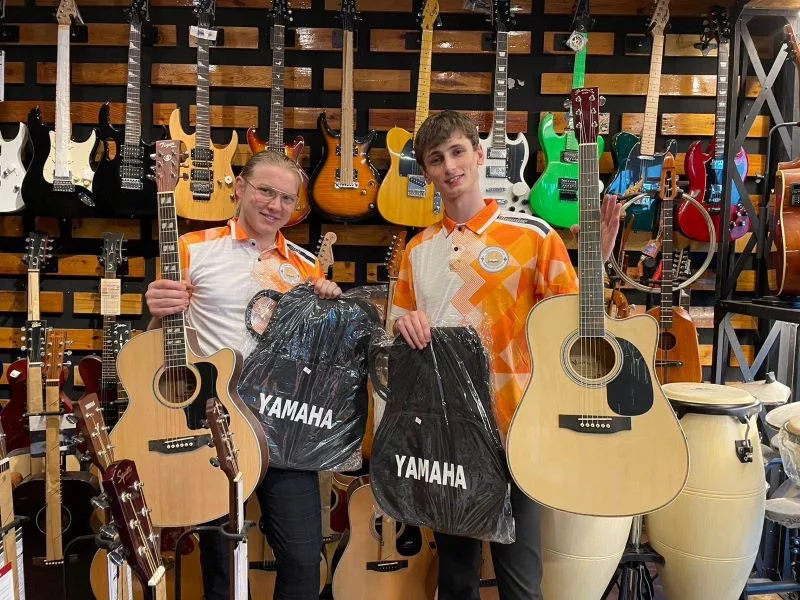
As a Volunteer in Thailand, I found myself immersed in a vibrant tapestry of culture, language, and traditions. Yet amidst the bustling streets and beautiful, scenic, landscapes, it was the universal love for music that harmonised my experiences from The Highlands of Scotland with my home away from home.
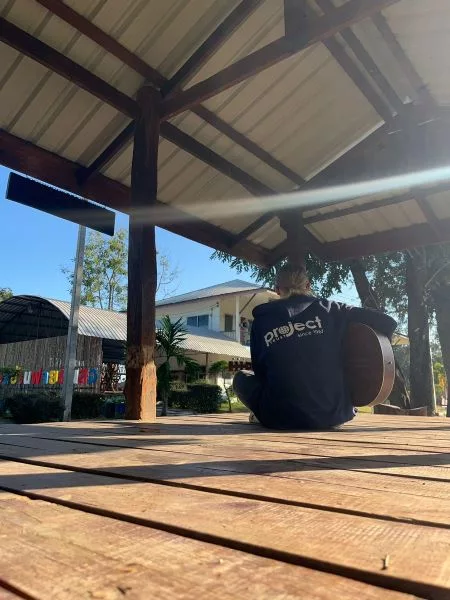
From traditional Ceilidh music (on the fiddle) or Scottish Folk Rock (on the guitar) or even just a bit of Burns poetry – these are all ways I have shared my passion and stories about my home with the amazing family I have found myself a part of in rural Thailand. Especially at celebrations and parties, I find myself playing music with friends and trading stories through songs until the early hours of the morning. I’ve enjoyed playing Flower of Scotland, Loch Lomond, Scotland the Brave and of course, Auld Lang Syne. I had the pleasure of bringing in the bells on New Year’s Eve with my friend T.Soo (the music teacher at school) and his family. We shared a particularly Scottish moment, and all sang along as I played Auld Lang Syne on the guitar.
Having recently bought a violin from Chum Phae, I have been teaching friends the Scottish fiddle and in return they have taught me the Thai Phin. The Thai Phin is a traditional instrument in north eastern Thailand.
Amid preparing for the upcoming English exams at school, I have also been practicing playing the Thai Phin with my fellow teachers at Baan Faidinsor, which has been a great way to connect and share stories. My friends here in Thailand have noticed my passion for sharing music from home and as a result, I have been asked to perform at my friend T.Aum’s wedding later this month. This will be my first experience of a Thai wedding and while there will be lots of traditional elements, I will be bringing some Scottish stories to the event by playing the fiddle. I am very humbled to have this opportunity and it really reaffirms how music is an integral part of both Thai and Scottish culture.
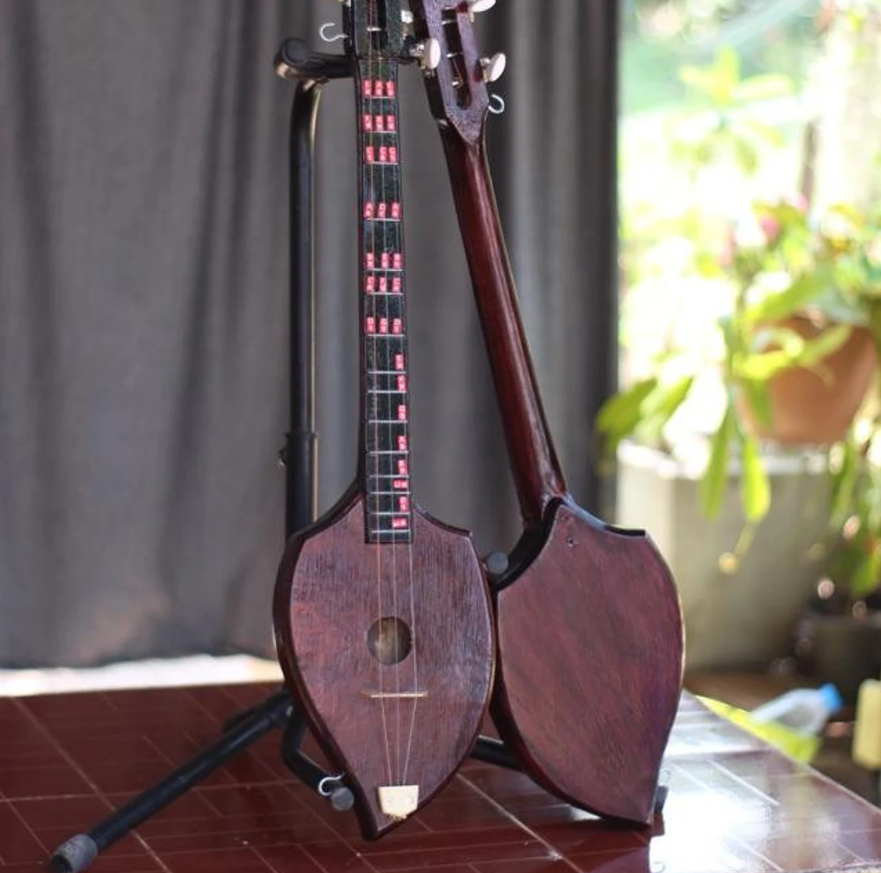
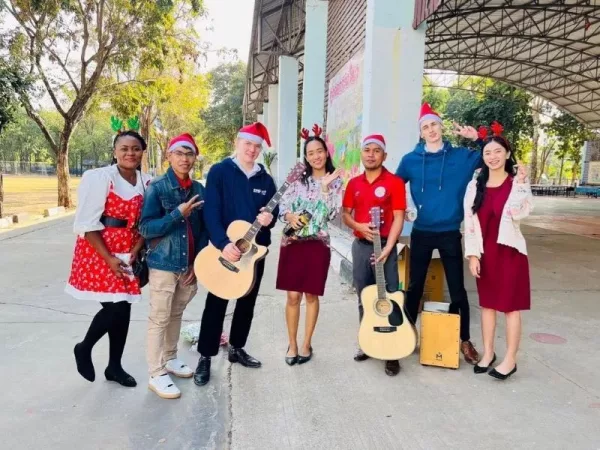

Being able to teach students and fellow teachers about traditional Scottish music and learn traditional Thai music in return has been a wonderful new experience for me. I’m just so glad this exchange of storytelling is in a language I understand – notes, chords and songs.
Learn more about what it’s like to Volunteer in Thailand by visiting our country page here.
-
Fiesta Típica in Yamaranguila (Paul, Honduras Volunteer 23/24)
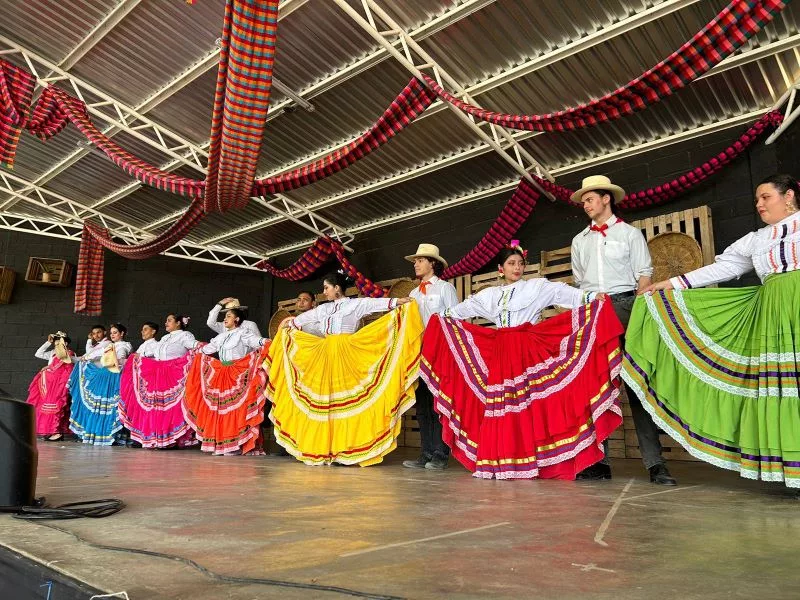
Fiesta Típica is a performance produced by Abundant Life Christian School which essentially acts as a fundraiser for the school. Families of the attending children come and enjoy traditional Honduran food and entertainment. Rory and I took this as an opportunity to throw ourselves into the local culture. We participated in the teacher’s dance, with each grade in the school practicing and performing their own dance. This ranged from the youngest, who brought the cute factor, to the oldest, whose coordination was genuinely impressive. We the teachers, however, were somewhere in the middle: not impressive but entertaining (though I’m still proud because we only had a total of four led practices).
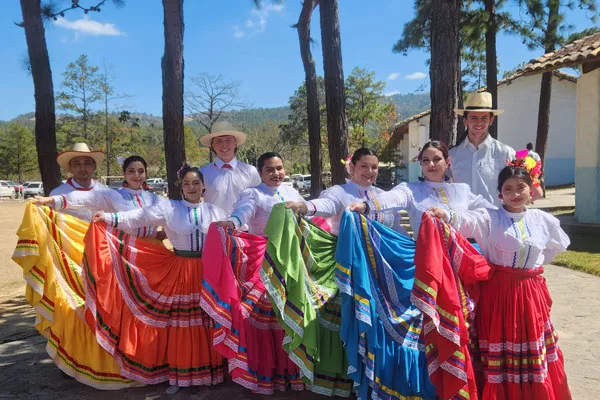
The outfits are very elegant. Women wear colourful dresses in beautiful shades of pink, yellow, orange, green and blue with eye shadow to match. For the men it’s a bit simpler, donning a smart shirt, traditional straw hat, and bandana.
The dance itself really emanates the culture. There’s a clear Spanish influence in the movements and look of it all, yet with an added elegance. It’s full of footwork and small movements (which I cannot claim to have mastered) that are representative of Hondurans’ desire to show a more graceful side of the country. It’s the kind of dance that you can perform in a place absent of lavish backdrops or designs as your eyes are drawn only to the mesmerising style and pride of each movement. This made it very fun to learn and I enjoyed being shown how to be more precise and confident in the smaller movements, compared to the wilder Scottish dances I’ve grown up with.
Fiesta Típica isn’t just about sharing stories of a collective Honduras through dance, art, and song but also a way in which each region of Honduras gets to tell their individual story.
Parents of scholarship students were responsible for setting up different ‘stalls’ during the day. All the stalls had a theme and sold different things, such as Baleadas and Papusas, to reflect the local style of each region in Honduras. Each team went to great lengths to prepare their stalls and the area quickly became animated with stories from Intibucá, Santa Barbra, and Santa Rosa. To illustrate just how much effort went into these stalls, imagine me, sleeves rolled up getting hands-on with a pickaxe in order to help dig a moat to fill with water and fish, representing team Santa Rosa. There was also a costume beauty pageant with the most dazzling outfits of all secondary grades, decked out in jewellery and animal skins representative of different localities.
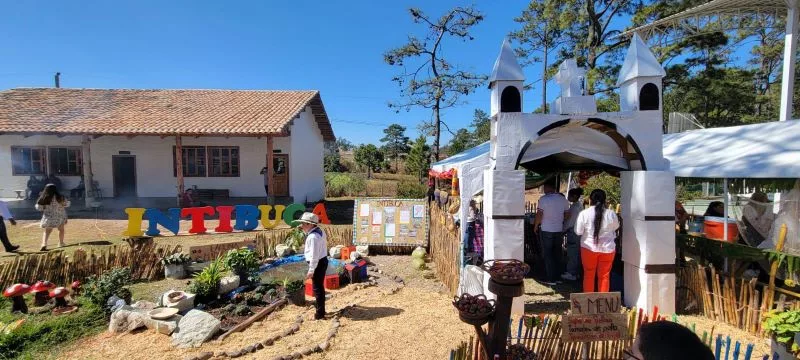
Being able to tell stories of Honduran culture through traditional dance and iconic dress will be something I will remember for the rest of my life. With great pride, I have been able to add it to the list of traditional dances I have learned alongside American Swing, Salsa, and of course my native Highland ceilidh. As a plus, the money earned on that day is currently being invested into new projectors for the school, with the goal to have one in every class. In a school of over 500 students, this will have a huge impact and Fiesta típica 2024 can be named a major success.

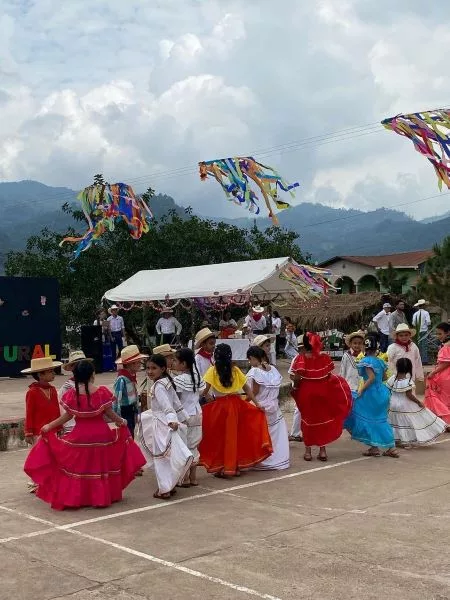
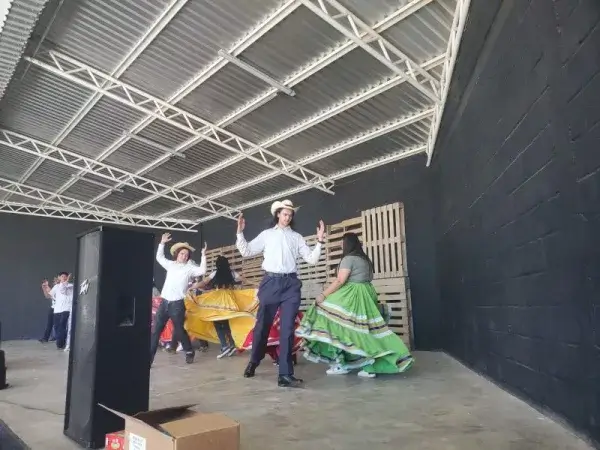
-
Tales that transcend language, place, and time (Jaele, Honduras Volunteer 23/24)
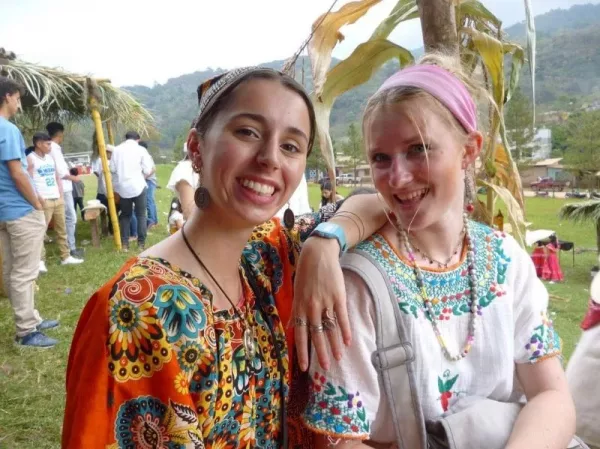
I was born in Stockholm, Sweden, where World Storytelling Day originated. In school, as well as at home, storytelling and reading was a huge part of my upbringing. My parents would take turns every night to read to me and my brother. With mum we’d read Swedish books like ‘Pippi Longstocking’ by Astrid Lindgren. With my dad, I remember reading ‘Where the Wild Things Are’, ‘Cat in the Hat’, and all the Roald Dahl books, many of which we’ve been using in the primary grades here. Seeing our students read some of the same books I used to read as a child is really wholesome. It’s particularly great to see them enjoy reading so much, despite the fact it’s in a language they don’t fully understand yet. I have also noticed that during reading the kids are more engaged and focused on the lesson than most other classes, which goes to show that having a playful element in the lessons really does help them learn, and teaching through storytelling is a powerful strategy.

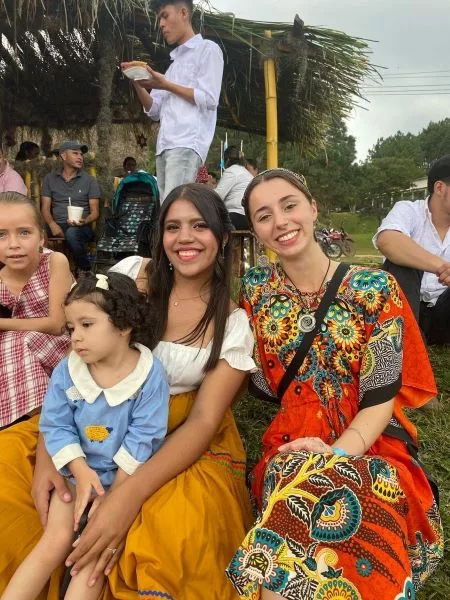
As I grew up in a bilingual home, I had the advantage of learning and speaking English from a very young age whilst in Sweden. Being able to speak English in a non-English speaking country is something I’ve always been grateful for, but being able to provide our students here in La Union with the same opportunity has been so rewarding. Just like my school in Stockholm, English is introduced first thing in kindergarten for the children at ALCS, with every lesson except Spanish and Social Studies being taught in English. Learning English through storytelling here has been so gratifying, especially as the kids are so keen to learn! I think working with children is something that will always have the same rewarding qualities, no matter what continent you find yourself on.
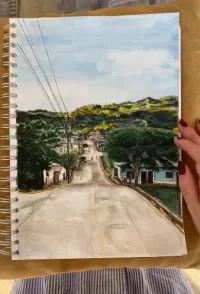
Having lived in two different countries growing up, moving to Honduras as a Project Trust Volunteer marks my third time being introduced and integrated to a new culture. It’s been very interesting to notice the differences of my two homes, Sweden and England, compared to Honduras but what has been most telling is seeing how some things don’t change at all, being on the other side of the world.
(Pictured Left: Jaele’s painting of her commute to work)
Something that both my partner Clemmie and I have realised is that kids will always be kids, no matter where in the world you are. The only difference I’ve seen between children in the UK, Sweden, and Honduras, is that they speak different languages and communicate their stories in different ways. Our students are always full of energy, curious, impatient, constantly giving out hugs left, right, and centre. They like to ask, “how old are you?”, “what’s your favourite colour?” and of course, “do you have a boyfriend?”. Storytelling has made us feel so much more connected with the community in La Union and finding similarities makes the fact we are so far away from home a lot easier.
Find out more about what it’s like to Volunteer in Honduras here.
-
Mentor Training
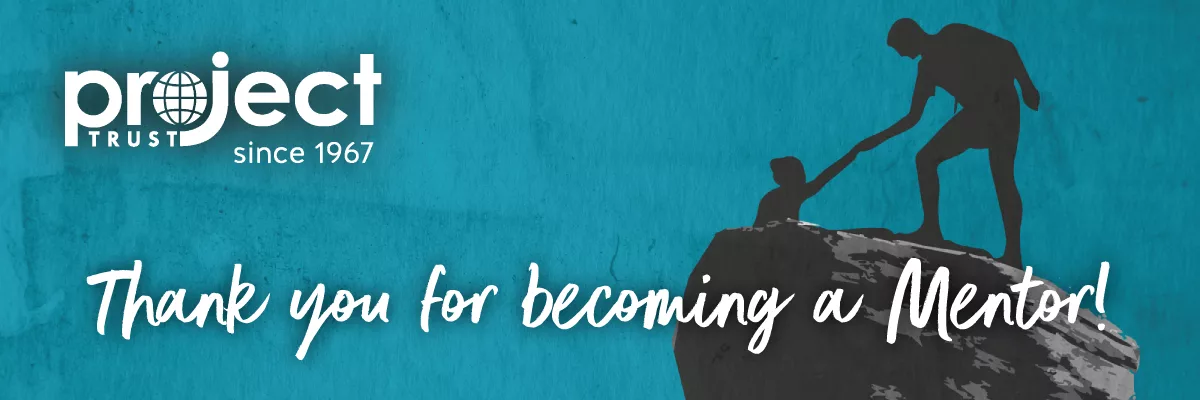
Calling all Returned Volunteers! Could you help future Project Trust Volunteers prepare for their placement abroad through becoming a mentor? Interested?
We’re excited to invite our existing and aspiring Returned Volunteers to our Mentor Training on Tuesday, March 26th, from 6 to 7 p.m. The training will be a short online session that connects our Mentor Community, ensures you have all the information you need, and gives you the opportunity to learn more about becoming a Project Trust mentor.
If you are already a Mentor or thinking of becoming one but unable to attend our Mentor Training, you can access the training materials in our online Mentor Pack. Once you have completed your training, you will be able to submit your Mentor Charter via the online Mentor Pack, apply for your Basic Disclosure, if required, and get started Mentoring!
Please click here to register for Mentor Training on Tuesday 26th March 6-7pm.
Brendan Proctor
